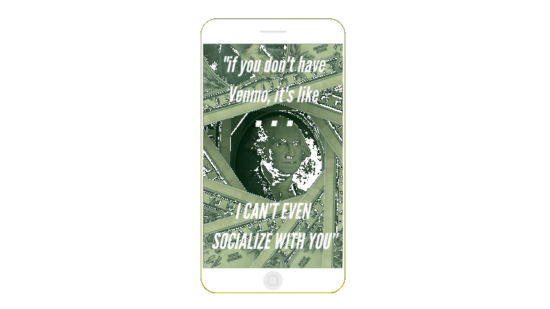Here we are. It’s 2019 and we live in a world where a money-transferring app distills the frivolous behavior of our generation down to digitally precise data points. “Yo Chad, Venmo me sixty for the Grey Goose.” “I’ll open a tab Stacy, you can just Venmo me in the morning.” “I’m so going to make him Venmo me for the Plan B.” Venmo has become a verb — an action so quick and carefree that users often wake up with depleted bank accounts and Venmo-induced hangovers. The app is marketed perfectly to a society under the tyrannical reign of technology and convenience. We blindly bow down at the effortlessness that the app brings to our lives. But that exact effortlessness is what older generations say marks a concerning shift in societal morals. Our generation’s frivolousness and move away from privacy, embodied by the popularity of an application like Venmo, is emblematic of our decline in values.

In Silicon Valley’s ruthless battle to capture convenience in an app, Venmo may just take the cake. In today’s world, easy is better. Easiest is best. Venmo co-founders Andrew Kortina and Iqram Magdon-Ismail have reached a Jeff Bezos-like status. A stroll through USC’s posh campus center confirms the total reverence for the app: “Omg I could not live without Venmo.” “Venmo is definitely my most essential app.” “If you don’t have Venmo it’s like … I can’t even socialize with you …” To resist technology’s ease — not own a smartphone, not have an Amazon account, not use Venmo — renders you some sort of old-fashioned freak. While students gushed over Venmo’s demiurgic powers, few could come up with criticisms for the app. But its most revered features — quick, easy, painless — are exactly what makes us spend as if we’re all a Rothschild or Koch brother. Here’s the way the app works: Short two bucks for that fro-yo? No problem. Tap the app, search your friend, type in two dollars, pay. Craving some over-priced leafy greens but forgot your wallet at home? Don’t sweat it. Tap, search, pay. Want to go in on this seven hundred dollar flat screen for our new apartment? Shoot I really shouldn’t spend that much right now. I’ll buy it, just Venmo me three hundred fifty ASAP. Tap, search, pay. Tap, search, pay. Tap, search, pay. Easy. Too easy, perhaps.

The structure of the application encourages frivolousness in spending. What is disguised as convenience is perpetuating a generation far more thoughtless than the last. In 1990, a pair of psychologists found that customers in a restaurant tipped almost 8% more when using a credit card instead of cash. Venmo takes the ‘monopoly money’ effect that credit cards created to a whole new stratosphere — now we don’t even have plastic cards to subconsciously shame us for our recklessness. My mother doesn’t seem to understand the concept of virtual money transfers. “So this money comes straight out of your bank account? … Straight out? … Just like that? …And then it’s just gone? Forever?!” Indeed. Poof. Vanished into thin air.
In this cash free world of mistaken money transfers and shameless over-spending, not only is it too easy to spend, but it is also quite easy to see who else is spending. The application’s default mode is that transactions and contact lists are publicly viewable. While you cannot see the dollar amount users spend, within mere milliseconds you can see what anyone is spending by simply scrolling through the home page. It is possible to make one’s ledger and contacts private, but almost everyone I talked to either didn’t know that fact or simply didn’t care.
In fact, most users desire the publicity. As with all else buzzword-studded and cleverly abbreviated, there is a performative quality to Venmo. Venmo distinguishes itself from other money-transferring apps like PayPal, Square Cash, or Google Pay, because it doubles as a social network. Venmo is perhaps the most intriguing and intimate social space. It suggests who is hanging out, who is secretly sleeping together, who is engaging in suspect behavior. The application requires you to write in what it is you are paying someone for. Scrolling through my news feed I can see that Amanda paid Hayley for “all the alcohols”, Izzy paid Jordan for “uber to the row last night”, and Sarah paid Jake for the ever-enigmatic “;)” Venmo is Facebook, Instagram, Snapchat taken to a new level — broadcasting, curating, and perpetuating FOMO through money. Students risk long-term future consequences for the short-term, social visibility.

The need to publicize one’s spending can have unintended consequences that go far beyond selfies and subtle stalking. Last fall two Los Angeles Times reporters who broke the story of USC’s medical school dean Dr. Carmen Puliafito keeping company with a circle of criminals and cocaine addicts spoke to my journalism class. As an aspiring reporter, this was my holy grail. “What technology played the largest role in the initial investigation?” My voice brimmed with anticipation. The reporters shot each other a knowing glance. “Venmo.” Turns out, these savvy, young reporters found one of their first iotas of evidence linking Puliafito with his coterie of cocaine-users through the money transferring app, Venmo.
* * *
Philosopher Allan Bloom wrote in the 1980s that students’ “values are not discovered by reason, and it is fruitless to seek them, to find the truth or the good life.” Instead, he contends that the students of the eighties absorbed their values mindlessly from popular culture. Today, our values are molded by technology and the aggressive onslaught of applications like Venmo. Our overly convenient culture consumes us — causing an overshare subculture and a carelessness that we cannot escape.
Graphics by Danny McCarthy